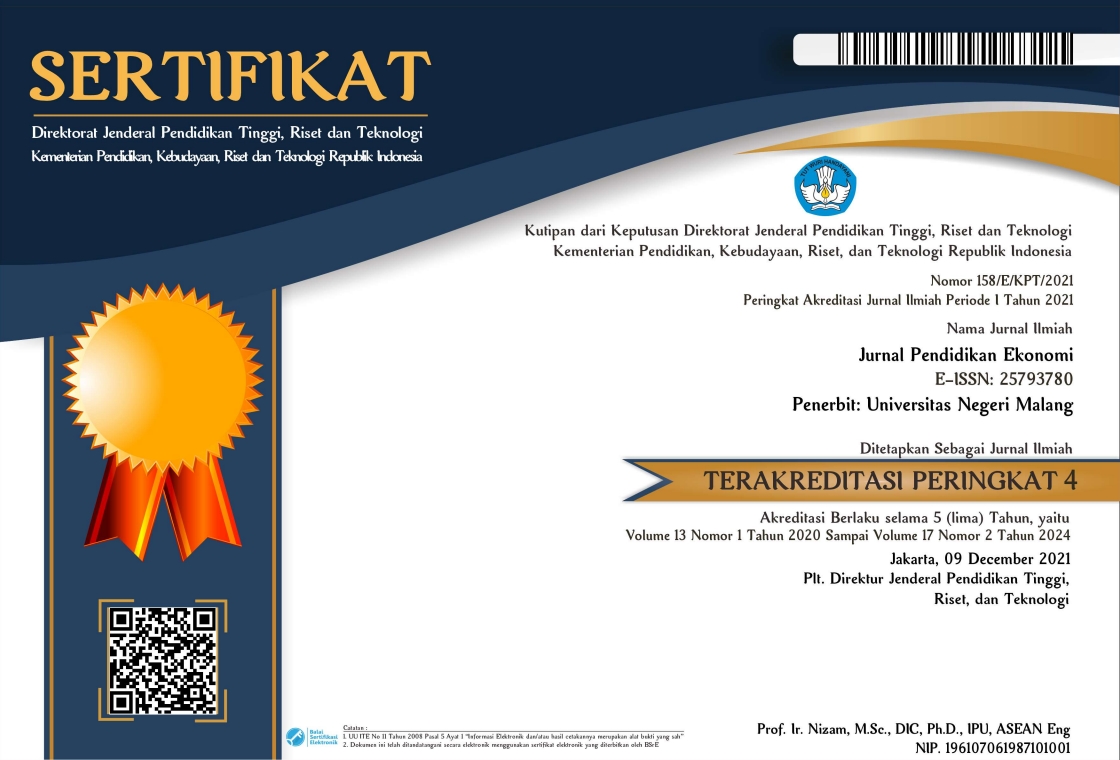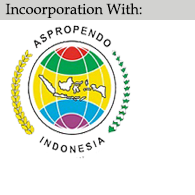The Influence of Perception, Literacy, and Religiosity on Generation Z's Interest in Islamic Banking
Abstract
Keywords: generation Z, Islamic banking, perception, literacy, religiosity
Full Text:
PDFReferences
Alfian, A. H., & Nugrahini, D. E. (2024). Religiusitas, pelayanan, dan promosi sebagai faktor keputusan nasabah untuk saving money di perbankan syariah. Jurnal STIE Semarang, 16(1), 86–99. https://doi.org/10.33747/stiesmg.v16i1.678
Astuti, I. R. (2020). Faktor-faktor yang mempengaruhi minat menabung di bank syariah Surakarta. Business Innovation and Entrepreneurship Journal, 2(3), 167–172. https://doi.org/10.35899/biej.v2i3.151
Aziz, M. F., & Jayanto, P. Y. (2021). Analisis faktor-faktor yang mempengaruhi keputusan anggota dalam menyimpan dana di KSPPS Kota Semarang. ECONBANK: Journal of Economics and Banking, 3(1), 27–36. https://doi.org/10.35829/econbank.v3i1.120
Dianto, S. (2016). Faktor-faktor yang berpengaruh terhadap minat masyarakat untuk menjadi nasabah bank syariah (Studi empiris pada masyarakat di Daerah Istimewa Yogyakarta). Yogyakarta: Skripsi FEB Universitas Muhammadiyah Yogyakarta.
Faisal. (2016). Analisis faktor-faktor yang mempengaruhi minat mahasiswa untuk menjadi nasabah di bank syariah. Yogyakarta: Skripsi Universitas Muhammadiyah Yogyakarta.
Francis, T., & Hoefel, F. 2018. True Gen: Generation Z and its implications for companies. McKinsey & Company. Retrieved from https://www.mckinsey.com/industries/consumer-packaged-goods/our-insights/true-gen-generation-z-and-its-implications-for-companies
Fauzi, M. C., Hasan, A., & Lutfi, M. (2024). Peran literasi keuangan, promosi, dan religiusitas terhadap minat generasi Z pada bank syariah di Kabupaten Kudus. An Nawawi, 4(1), 41–54. https://doi.org/10.55252/annawawi.v4i1.45
Ghufron M. N., & Risnawati, S. (2010). Teori-teori Psikologi. Ar Ruz Media: YogJakarta
Ilmiah, D. (2019). Optimalisasi asset wakaf melalui sukuk wakaf di Indonesia. Jurnal Ekonomi Syariah Indonesia, 9(2), 1. http://dx.doi.org/10.21927/jesi.2019.9(2).127-137
Indi, I. (2019). Faktor-faktor yang memengaruhi minat masyarakat menabung di bank syariah (Studi kasus pada masyarakat di Kecamatan Rappocini Kota Makassar). Journal of Chemical Information and Modeling, 53(9), 1–21.
Rizvi, S., Naqvi, B., & Tanveer, F. (2018). Is Pakistan ready to embrace fintech innovation? The Lahore Journal of Economics, 23(2), 151–182. https://doi.org/10.35536/lje.2018.v23.i2.A6
Khan, M. S., Azad, I., Moosa, S., & Javed, M. Y. (2024). Do we really need financial literacy to access the behavioral dynamics of generation Z? A case of Oman. Heliyon, 10(13), e32739. https://doi.org/10.1016/j.heliyon.2024.e32739
Kotler, P., & Amstrong, G. (2008). Prinsip-prinsip pemasaran. Jakarta: Erlangga
Li, C., Liu, J., Liu, Y., & Wang, X. (2023). Can digitalization empowerment improve the efficiency of corporate capital allocation? – Evidence from China. Economic Analysis and Policy, 80, 1794–1810. https://doi.org/10.1016/j.eap.2023. 11.014
Linnes, C., & Metcalf, B. (2017). iGeneration and their acceptance of technology. International Journal of Management & Information System, 21(2), 11–26.
Mansour, W. (2020). Toward new strategies of Islamic financial products development. Journal of Islamic Accounting and Business Research, 11(10), 2053–2067. https://doi.org/10.1108/JIABR-09-2018-0135
Maharani, R., Supriyanto, T., & Rahmi, M. (2021). Faktor-faktor yang mempengaruhi minat menabung di bank syariah (Studi Kasus pada BSI Ex BSM). Jurnal Syarikah, 7(2), 127–135. https://doi.org/10.30997/jsei.v7i2.4483
Nurohman, Y. A., & Qurniawati, R. S. (2022). Persepsi nasabah Generasi Z pasca pengumuman merger bank syariah. Among Makarti, 14(2), 13–28. https://doi.org/10.52353/ama.v14i2.215
Naeem, M., & Ozuem, W. (2021). The role of social media in internet banking transition during Covid-19 pandemic: Using multiple methods and sources in qualitative research. Journal of Retailing and Consumer Services, 60, 102483. https://doi.org/10.1016/j.jretconser.2021.102483
Nga, L. P., & Tam, P. T. (2023). Impact digital banking development on the business efficiency: A case study of commercial banks in Vietnam. Journal of Law and Sustainable Development, 11(9), e859. https://doi.org/10.55908/sdgs.v11i9.859
Pangestuti, R. (2022). Pengaruh kelompok acuan, gaya hidup, dan literasi keuangan syariah terhadap keputusan menjadi nasabah bank syariah indonesia (BSI) kcp kendal weleri dengan minat sebagai variabel intervening. Iain Salatga.
Puspita, A. T., Lubis, D., & Marhamah Muthohharoh. (2021). Faktor–faktor yang memengaruhi tingkat literasi keuangan syariah pada mahasiswa muslim di Bogor. Al-Muzara’Ah, 9(1), 1–20. https://doi.org/10.29244/jam.9.1.1-20
Sharma, S. K., & Sharma, M. (2019). Examining the role of trust and quality dimensions in the actual usage of mobile banking services: An empirical investigation. International Journal of Information Management, 44, 65–75. https:// doi.org/10.1016/j.ijinfomgt.2018.09.013
Saud, M.I., Teguh. I., & Nugraheni. (2018). Analisis faktor yang mempengaruhi perilaku nasabah perbankan konvensional beralih ke perbankan syariah. Jurnal InFestasi, 14(2), 133-145
Supriyanto., Siswanto., & Yayuk. (2023). Factors Affecting Customer Loyalty of Bank Syariah Indonesia. International Journal of Social Science and Business, 7(2), 416–424. https://doi.org/10.23887/ijssb.v7i2.53520
Shahid, M., Bhatti, F. A., Meeran, M., Mohtesham, J., & Mahadi, N. F. B. (2020). The value propositions and the nature of the Islamic banks products and services in providing the solution/s for the financial needs of BIMB business customer segments. Journal of Islamic Economic and Business, 3(2), 257–281. https://doi.org/10.21154/elbarka.v5i1.3815
O’Boyle, C. Atack, J. & Monahan, K. 2017. Generation Z enters the workforce. Deloitte Insights. Retrieved from https://www2.deloitte.com/
Yikun, Z., Woon Leong, L., Cong, P. T., Abu-Rumman, A., Al Shraah, A., & Hishan, S. S. (2023). Green growth, governance, and green technology innovation. How effective towards SDGs in G7 countries? Economic Research-Ekonomska Istraživanja, 36(2), 1–19. https://doi.org/10.1080/1331677X.2022.2145984
DOI: http://dx.doi.org/10.17977/UM014v17i2p187
Refbacks
- There are currently no refbacks.

Jurnal Penddidikan Ekonomi is licensed under a Creative Commons Attribution-NonCommercial-ShareAlike 4.0 International License





